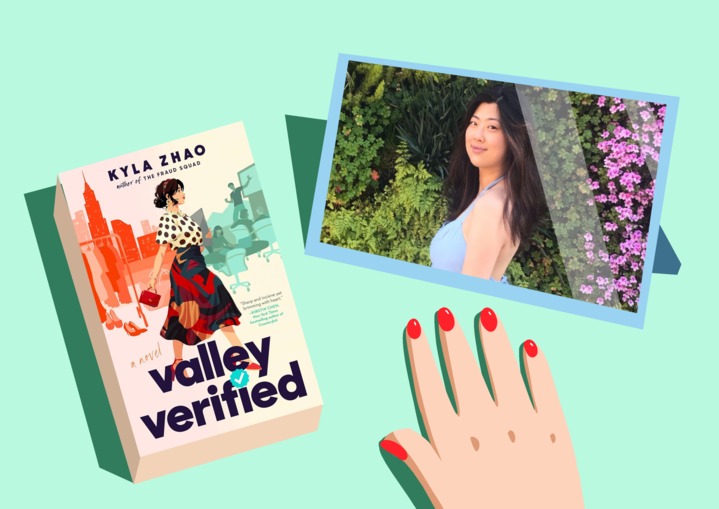In 2020, Kyla Zhao ’21 did the most logical thing a Stanford junior would do during a pandemic: write a book. As a psychology major, Zhao had never taken any creative writing courses, but her imagination took over.
Sitting in her apartment more than 8,000 miles away from her hometown, Zhao daydreamed of high-society socialites getting dolled up to get whisked away to grand parties, escaping the reality of her COVID life. Thus, the seedling of her first book was planted: “Fraud Squad.”
“I was really, really homesick and missed my family a lot. I wanted to write a story that was set in my home country of Singapore. It was like a love letter to home at that time,” Zhao said.
Since its publication last year, “Fraud Squad” has been praised by outlets including Cosmopolitan as a “Crazy Rich Asians” and “Gossip Girl” crossover. Yet underneath the glamorous haze of protagonist Samantha Song’s whirlwind entrance into the Singapore socialite scene, the book’s core, Zhao said, is about imposter syndrome. For Zhao, writing served as a catalyst for understanding her own psyche, becoming a creative platform to explore her own life through fictional characters and worlds.
“My therapist was like, ‘Kyla, I want you to think about why you like writing about imposter syndrome,’” Zhao said. “I think a lot of it just stemmed from my own confusion in my own life, not knowing what I wanted.”
After graduating in 2021 with a bachelor’s degree in psychology and master’s in communication (and two books en route to publication), Zhao spent a couple of months at Vogue Singapore, writing about the intersection of fashion and technology. Then, she came back to the Bay Area to join a tech company as a data analyst.
Now, the majority of Zhao’s day is spent crunching numbers and writing code, while evenings are dedicated to book writing — a balance that she appreciates.
“I wouldn’t want to be writing at my day job all day and then have to go back home and be like, ‘Oh, shucks, I have to write even more words for my book,’” she said.
Chady Hamida ’21, a friend of Zhao’s who lived in the same freshman dorm, said he wouldn’t have predicted her career shifts. Yet he could see how Zhao’s pursuit of many different interests in college influences her work.
“She got new hobbies very suddenly, and I think that translates into the books that she’s writing now,” Hamida said.
To balance both careers, James Ngo, Zhao’s housemate, said Zhao is fairly disciplined with her writing routine. For example, said Ngo, she will go to a cafe to write, but purposely not bring her charger so that she has a conscious deadline. “She definitely has to make sacrifices in terms of how she manages her time,” he said.
That doesn’t mean that her two professional careers don’t intersect at certain times. Her second book, “Valley Verified,” pulls from many of Zhao’s own experiences. The story details protagonist Zoe Zeng’s drastic career shift from a New York City fashion company to a Silicon Valley startup.
Zhao started writing the novel while starting her new tech job, an era of her life during which she felt lost in her career trajectory. Thus, the book, much like her first, examines imposter syndrome and the struggles of dealing with major life changes.
Zhao said she fleshed out the majority of the book’s central plot during a plane ride to Singapore for the holidays in 2021. The 17 hour trip allowed herself to be alone with her own thoughts, forcing her to confront her biggest case of duck syndrome yet — she presented a calm and relaxed image, all the while struggling to stay afloat.
“I remember thinking to myself, ‘What am I going to stay when my parents asked me how my job is going?’ Face to face, they would immediately be able to tell from my expression that something was wrong,” she said.
This internal dialogue sparked the first line of the book, notably ironic in its context: “Zoe was having an absolute blast.”
“She was lying to herself. She was lying to the people around her just like I was,” Zhao said. “We were putting up this facade of success, when deep down, we just felt so unaccomplished and unfulfilled.”
Zhao’s first two books centered on experiences of Asian female protagonists. Her ambition to further nuanced representation in literature drove her to write her upcoming middle-grade book, “May the Best Player Win,” set to publish in September 2024. The novel draws on her experiences as a competitive chess player in the male-dominated chess scene.
Zhao said the book took inspiration from the youthful innocence she noticed to be fading in the 2020 election cycle, which is when she wrote the majority of the book. She added that there are even some Stanford Easter eggs sprinkled throughout the book.
Though Zhao hopes to continue writing, she said she’s not planning to pursue a full-time author career anytime soon.
“If I had to depend on it as my livelihood, I’m gonna feel a lot more tempted to pay attention to the business and commercial side of it, rather than writing what I genuinely would enjoy reading. I don’t ever want to end up in a situation like that,” she said. “Life just took me down this path. And I think it turned out very nicely.”
